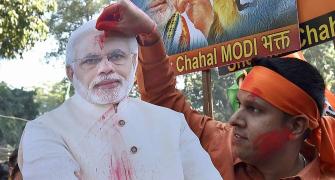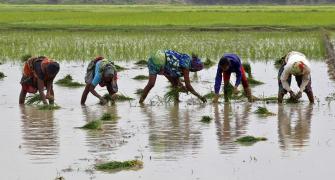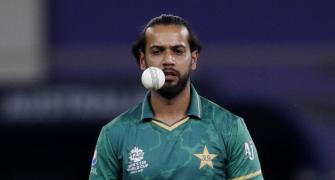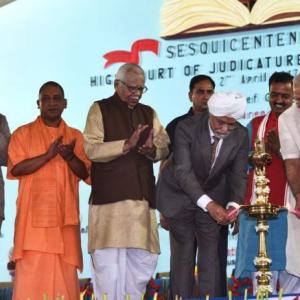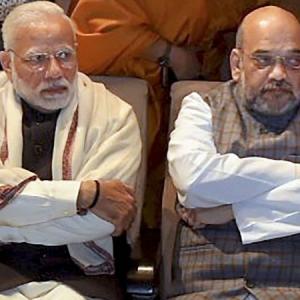'The situation in the country is very scary.'
'There is an increasing attack on the Constitutional democratic rights of our people.'
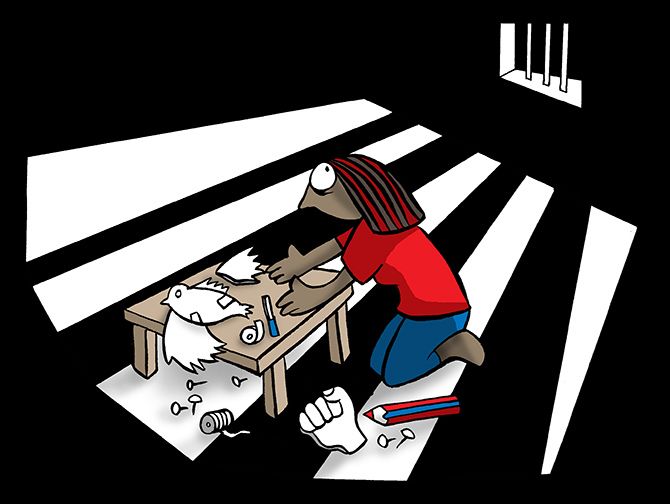
Illustration: Uttam Ghosh/Rediff.com
"People should take note of this reality: The BJP is on the decline," Communist Party of India MP Doraiswamy Raja tells Aditi Phadnis.
The Budget session of Parliament in underway. A meeting of Opposition parties in which you, as leader of the the CPI participated, took place. In your view, where is Opposition unity going?
As far as my party is concerned, the current situation in the country demands unity of all secular, democratic and Left parties and forces.
There is need to build the broadest possible, united resistance to the onslaught from the BJP-RSS (Bharatiya Janata Party-Rashtriya Swayamsevak Sangh) combine.
In the face of this, we should move towards uniting all democratic secular forces on one platform to give a credible message to the people that the interests of the country and the people will be protected.
The situation in the country is very scary. There is an atmosphere of fear across the nation.
There is an increasing attack on the Constitutional democratic rights of our people.
Wherever we travel, we see a kind of hate being created by right-wing extremist forces.
These are forces affiliated to the RSS, having ideological affinity to that organisation. How do we stop this?
Parties which believe in secular democratic values and feel they should be protected must come together.
The prime minister himself and others in the ruling alliance have said time again that they don't support vigilante-ism, that they have no intention of making changes to the secular or democratic nature of the Constitution.
So are we seeing ghosts where none exist?
The prime minister did make a statement...
He has made at least three statements...
OK, three statements, in different contexts. That is true. But how seriously his statements are taken by his own party and outfits is another matter.
For instance, you referred to cow vigilante-ism. It is happening in BJP-ruled states -- Rajasthan, Haryana, Madhya Pradesh, Uttar Pradesh. Why are BJP-ruled states not acting against perpetrators of this kind of violence?
Or these 'love jihadi' groups? If this is happening despite the PM's instructions, then we should ask if the PM is helpless?
I do not agree with people who call them fringe elements or fringe groups. They are ideologically conscious groups who act with courage and a sense of impunity that they can take the law into their hands.
One Union minister (Anant Kumar Hegde) said, 'Those who believe in a secular Constitution don't know their parentage.' Is this the way for a minister to talk?
He said the Modi-led government is in power to change the Constitution.
He was pulled up for that statement.
He was not pulled up. The issue was raised in Parliament. He was present. He was not explaining or apologising.
The government did not question him. The party did not question him.
Only when an uproar was created in the House did he regret his statement and the BJP distanced itself from his remarks.
What is happening in Karnataka? The way they are posing the issue is: 'I don't want Muslim votes, I need only Hindu votes.'
People have other problems -- livelihood, unemployment, education, healthcare... these are genuine issues and people are diverted.
There is unrest among young people because of unemployment.
Instead of challenging these problems, they are getting diverted.
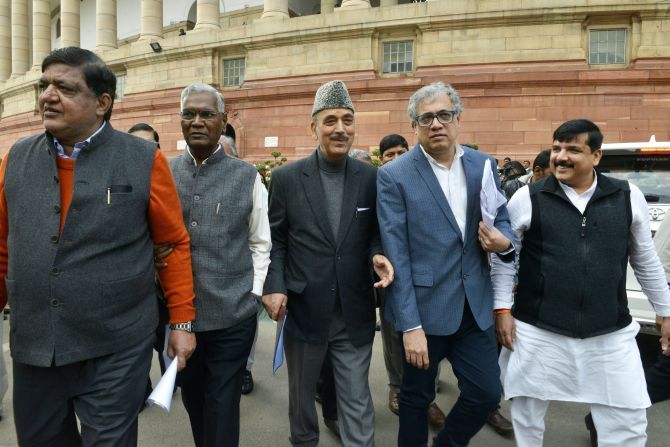
IMAGE: CPI leader D Raja, second from left, with Samajwadi Party MP Naresh Agarwal, Congress MP Ghulam Nabi Azad, Trinamool Congress MP Derek O'Brien and the AAP's Sanjay Singh outside Parliament. Photograph: PTI Photo
Isn't this happening partly because you, as the Opposition, have failed to get your act together? There are parties in the Opposition which do not agree on anything, even internally, let alone with one another.
That is why you are unable to capitalise on rifts within the ruling NDA (National Democratic Alliance)...
I will put it differently. It is time that parties in the Opposition -- those who believe in secularism, democracy and the Constitution -- got their act together.
Every party will have to do serious introspection. They will have to come to an understanding internally.
Then, all the parties must come to a common understanding with each other on issues.
Then it becomes easy.
This is the effort we have been making.
Sharad Yadav was removed from the Janata Dal-United and he started a movement for composite culture. He's had meetings all over the country.
All the parties participated.
On January 26, Sharad Pawar organised 'Save the Constitution' march. There too, we had a range of people from Omar Abdullah to Hardik Patel.
Representatives of the Trinamool Congress, Left parties, Congress in full strength.
But this is the same NCP (Nationalist Congress Party) which worked to prevent the victory of the Congress in Gujarat on at least two occasions. It failed once, it succeeded the second time -- I am not saying this, it is leaders of the Congress like P Chidambaram and Prithviraj Chavan who are saying this.
I will come to that. What I am trying to say is: Issue-based campaigns did bring parties together.
When it comes to elections, it is a separate matter. Because elections are state-specific.
The CPI-M (Communist Party of India-Marxist) has been saying they cannot have an electoral tie-up with the Congress for political reasons. That is being debated in the public domain.
In Gujarat, the Congress could have reached out to the NCP and other parties. There could have been a broad electoral understanding.
Maybe now, lessons have been learnt.
Gujarat is over. What next?
One, till now, a myth was created. The myth was: The onward march of the BJP cannot be stopped. The other myth was: Narendra Modi is invincible. These myths have been broken.
For instance, even in the elections -- the last round of elections: The BJP did not win in Punjab.
In Goa and Manipur, if you see electorally, the BJP did not win. They manipulated to form the government. But in the election they...
I did not see anyone from any party challenging government formation in these states in any meaningful way.
In Arunachal Pradesh some time ago, it was the Supreme Court that restored the Congress-led government, not a people's movement...
The issue was raised!
In Bihar, the BJP did not win the election. They broke the alliance and joined the government, that's a different thing.
But morally and politically speaking, they did not win the elections. And then, by-elections. Including Gurdaspur in Punjab -- huge margins of victory.
And the recent elections in Rajasthan and Bengal. All won by the Opposition. The BJP lost badly.
This is what I am saying. People should take note of this reality: The BJP is on the decline.
And that is where parties which are in the Opposition -- I would say, parties which believe in secularism and democracy -- have the opportunity to go to the people.
You would be content to give the leadership to the Congress...
Who leads is not the issue.
The more important thing is, we all should work together, move together... not only in Parliament, also outside.
There can be difficulties in some states. But at the national level, we all should work together.
On that, there is agreement.
Leadership?
Whichever party has the largest presence in a state, must lead. At the national level, of course, the Congress is the largest.
You have had dealings with the Congress in the past. What do you like about them and what do you think is unhealthy?
In 1996, when the United Front was formed, the Congress supported it from outside.
We agreed on a common minimum programme. Later, that government went out of power.
Then, the UPA (United Progressive Alliance) was formed. The Left parties supported the government from outside.
There was a common minimum programme, but when there were deviations from the CMP, there were problems.
Once, on the divestment of BHEL (Bharat Heavy Electricals Limited) we had differences. Sonia Gandhi intervened, it was put on hold and we started working together.
What I am trying to say is, there was a programme which bound us together. There was commitment.
During the prime ministership of P V Narasimha Rao when the neo-liberal economic policies were put in place, the Left resisted and opposed these policies vigorously.
But the situation was changing, the BJP was emerging and the context was changing.
During our tenure in government, we did influence the government in a pro-people direction.
But UPA II steamrolled certain policies that gave a handle to Modi. Many have been adopted -- and adapted -- by him.
The Congress is struggling to distance itself from its own policies.
The Congress will have to recapture the Nehruvian legacy of standing with the people's cause. And the Left too will have to do some introspection.
We will have to rejuvenate ourselves. It is a hard task.



